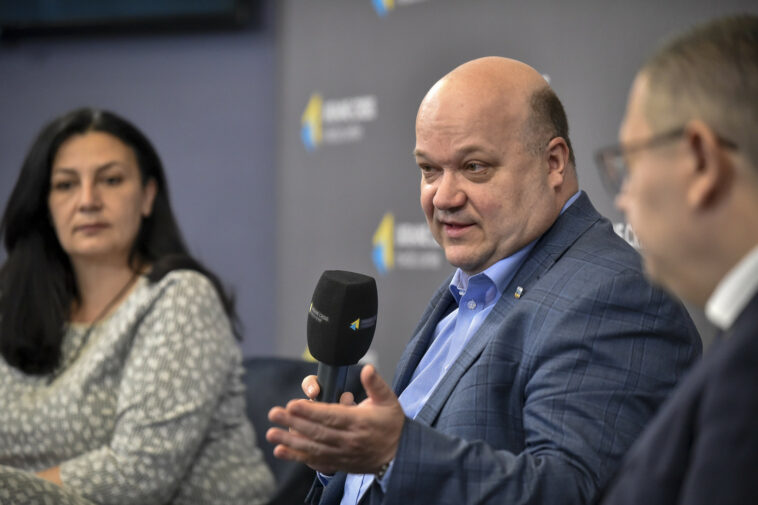Valeriy Chaly, former ambassador to the US and Head of UCMC, sheds light on the importance of NATO membership for Ukraine’s defense, the dangers of inaction from the West, and the significance of the upcoming NATO summit. This article explores Valeriy’s perspectives on Ukraine’s aspirations, the potential consequences of non-membership, and the need for a united front against Russian aggression.
Watch the full interview here
People and Political Unity: A Rare Ukrainian Occurrence:
Valeriy highlights the strong consensus among Ukrainians, emphasizing that it is challenging to find a Ukrainian politician who opposes Ukraine’s accession to NATO. He tells how such unity is a unique thing for Ukraine and how almost all Ukrainians support the initiative.
The Urgency of a NATO Decision
On the issue of deciding what guarantees Ukraine will need to receive and what Ukraine can expect from the upcoming NATO summit, Valeriy tells how Ukraine cannot be expected to and will not be able to defend NATO’s western borders indefinitely, with NATO sooner or later having to either join the effort or risk Russia coming back for more Ukrainian land in the future.
While the upcoming NATO summit holds significance for Ukraine, Valeriy emphasizes that the most crucial aspect is achieving a political outcome rather than diplomatic language or ‘promising signals’.
Kissinger’s Shifting Stance
Valeriy mentions how Kissinger, potentially one of the most well-respected diplomats in the democratic world, first called for Ukraine’s neutrality. But this was short-lived, after Kissinger argued NATO should, in fact, accept Ukraine into the alliance because it would make Ukraine ‘easier to control.’
He goes on to tell how, for those that believe there is more that can be done, Ukraine has already exhausted all other options, which eventually led to the full-scale war, despite Ukraine’s attempts to compromise with Russia, such as incorporating Russia’s requests into its constitution and allowing a military base in Crimea (Sevastopol).
Lessons from Past Aggression: Consequences of Inaction
Valeriy highlights the dangers posed by the West’s inaction in response to Russia’s previous acts of aggression and illegal invasions of Georgia and Crimea, telling how the lack of substantial punishment for these actions has led Putin to perceive them as an invitation for further aggressive behavior.
In the face of limited defense options, he goes on to mention that Ukraine is now seeking a solution to its defense, and this desperation has lowered the threshold for considering any possible means of protection. There are even emerging calls for Ukraine to regain its status as a nuclear state, a move that he says would likely result in an increase in parties advocating for nuclear weapons or dirty bombs and garnering substantial support among Ukrianians.
He warns, “These parties will receive more public support if Ukraine lacks a ratified collective defense and if agreements with our partners fail.”
The Unity Could Crack
He expressed concern about the real danger of Ukraine’s defense options becoming radicalized if NATO refuses its membership, telling how “such refusal could lead to increased skepticism and negativity towards NATO, potentially reverting to the narrative of the Soviet era that portrayed NATO as a weak organization.” Valeriy pointed out that this narrative has already started to gain traction, as evidenced by Zelenskyy’s statement regarding his ‘maybe’ attendance at the NATO summit; it shows Ukraine’s patience is waning.
“It’s the start of a demonstration that perhaps NATO isn’t necessary for us. It is a signal to say, ‘If you don’t want us to come, that’s fine; we’ll find another path.'”
If not NATO, then Ukraine will be forced to seek partners willing to defend with Ukrainian soldiers, many of whom raised the possibility of creating various coalitions at the beginning of the full-scale invasion, such as the British-Polish-Ukrainian alliance. Valeriy explains why these potential coalitions have seen a silence since.
“One of the reasons why these smaller collaborations have not occurred thus far is to avoid interfering with NATO’s unity, but if our negotiations with NATO were to fall apart, we would be forced to pursue a different path just to survive.”
A Proven Strategic Partner
He concludes by highlighting the importance of Ukraine’s successful land forces component, as well as the fully trained army to NATO standards on NATO weaponry, and how this is a serious factor for NATO to consider. “It has made us a strategic partner,” Valeriy says.
“I believe that we cannot maintain security in Ukraine for an extended period without our partners, just as NATO cannot.”


